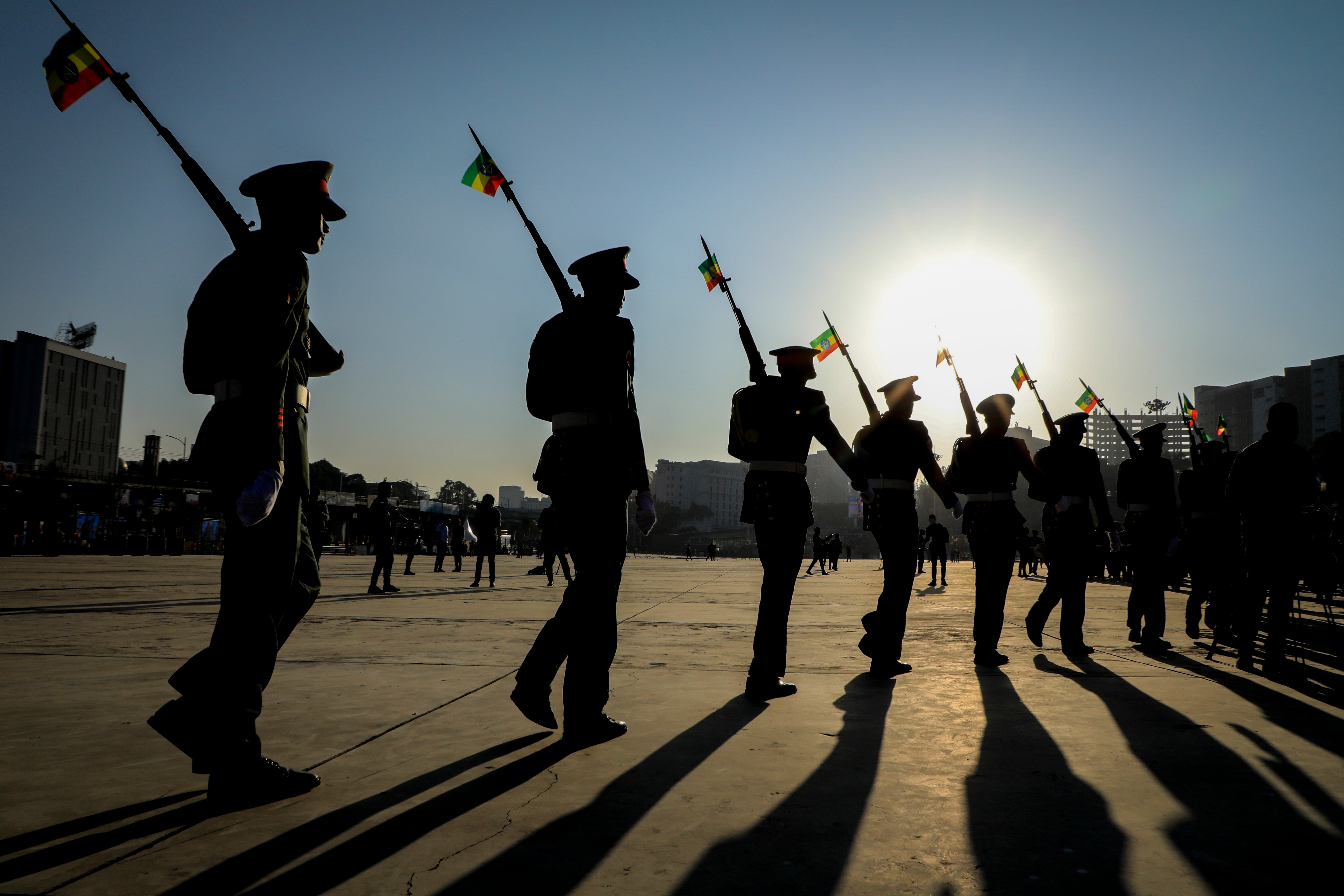People fleeing Ethiopia allege attacks, forced conscription
People fleeing Ethiopia say a new round of deadly attacks and forced conscription has begun against ethnic Tigrayans who remain in an area now controlled by Amhara regional authorities in collaboration with soldiers from neighboring Eritrea

A new round of deadly attacks and forced conscription has begun against ethnic Tigrayans in an area of Ethiopia now controlled by Amhara regional authorities in collaboration with soldiers from neighboring Eritrea people fleeing over the border to Sudan tell The Associated Press as the yearlong war intensifies.
Three men who fled the western Tigray communities of Adebay and Humera in the past week described warnings from Amhara authorities against supporting the rival Tigray forces who are approaching Ethiopia’s capital, Addis Ababa, to press Prime Minister Abiy Ahmed to step aside.
Their threat led Ethiopia’s government to declare a state of emergency last week while the United States and other countries urged citizens to leave immediately. U.S. and African Union envoys have been holding urgent talks in Ethiopia in search of a cease-fire in a war that has killed thousands of people after political tensions with the Tigray forces who once dominated the national government turned deadly. The U.N. Security Council is expected to meet on Monday.
The new accounts confirm assertions by the U.S. and others that Eritrean soldiers remain in the Tigray region, and they indicate that pressure is growing on Tigrayans of mixed heritage who have tried to live quietly amid what the U.S. has alleged as ethnic cleansing in western Tigray.
As reports grew about the Tigray forces’ momentum, Amhara authorities at a public meeting in Adebay on Oct. 29 warned residents against supporting them, two men who fled to Sudan said.
“There are people working for (the Tigray forces). You should give them to us or we will kill you all together,” one who fled, 28-year-old Mawcha Asmelash, recalled authorities saying.
Five days later, he said, Amhara militia attacked. “I saw four people being killed on the run,” he said.
He and other men hid in the bush for two days, gathering information from local women and trying to judge whether it was safe to return. But the women estimated scores of men had been killed and residents had been forbidden to bury their bodies. The women urged them to flee.
Another man who fled Adebay, 36-year-old Berhane Gebremikael, confirmed the public meeting. He said he saw one man killed as he ran from Amhara militia and the Eritrean soldiers, who he said have a camp in the community.
“They called it revenge,” he said. He described a perilous situation for Tigrayan residents of Adebay who had remained during the war, with many changing their identity, paying bribes or using mixed heritage for a measure of protection. Berhane, whose mother is Eritrean, now fears he can’t return.
“Maybe the worst things will happen in the next days,” he said. “The international community should intervene.”
A man who fled to Sudan from the city of Humera, near the Eritrean border, told the AP he had stayed there because of his part-Tigrayan heritage, but last week Amhara authorities “started collecting people. Young men and boys are being forced to join the fighting.”
Again, it started with a public warning, 28-year-old Alemu Abraha said. Then Amhara authorities, along with Eritrean soldiers, started visiting homes at night to take people away. His friends were taken, he said, and he believes the men are being sent to the Amhara region, where most fighting has occurred in recent months.
Amhara regional spokesman Gizachew Muluneh did not respond to AP questions. Amhara regional officials have asserted that western Tigray is historically their land, and during the war witnesses and humanitarian workers have described scores of thousands of Tigrayans forced from communities there.
Meanwhile, reports of mass detentions of Tigrayans continue under the state of emergency. An Ethiopian Orthodox Church official in Addis Ababa, speaking on condition of anonymity for fear of retribution, said dozens of priests, monks, deacons and others had been detained in the capital because of their ethnicity. Ethiopian authorities have said they are detaining people suspected of supporting the Tigray forces.
The government-created Ethiopian Human Rights Commission in a statement noted with concern that “arrests appeared to be based on ethnicity” and included the elderly and mothers with children.
As the war closes in, Ethiopia’s government insists that life in the capital remains normal. On Sunday, scores of thousands of people rallied in Addis Ababa in a show of support, some carrying signs criticizing the international community, including foreign media.
There were also calls for peace amid the sometimes graphic calls to war. “Can they not discuss around a table?” said one demonstrator, Lemelem Selega, who also denounced those “who are spilling our soldiers’ blood.”
African Union special envoy Olesegun Obasanjo, a former Nigerian president, was briefing the AU Peace and Security Council on Monday about his meeting with Tigray leader Debretsion Gebremichael in the Tigray regional capital over the weekend. Tigray forces spokesman Getachew Reda called the discussion “very fruitful.” Obasanjo’s spokesman did not respond to questions.
The U.S. has not released details on special envoy Jeffrey Feltman’s meeting with Ethiopia’s prime minister last week, which the prime minister's spokeswoman called “constructive.”
Bookmark popover
Removed from bookmarks